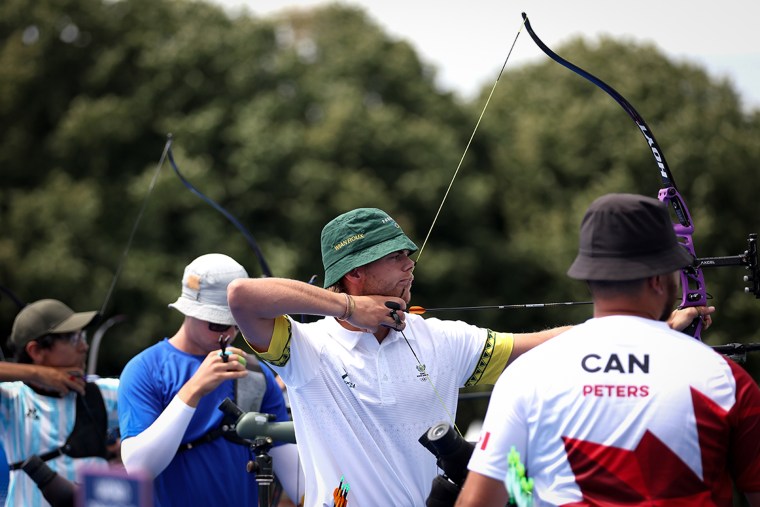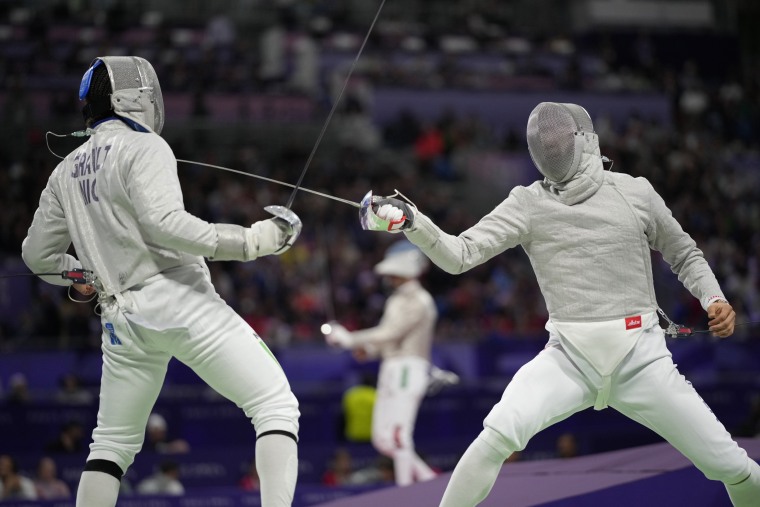PARIS – Even if Israel Madaye had deflected all his arrows off target and scored zero points, the archer from Chad, Central Africa, wouldn’t have cared.
Although he came last in his event, making it to Paris 2024 was a colossal achievement. He will always be one of the 10,500 athletes competing here who can call themselves Olympians, able to sign the honorific OLY for the rest of their lives with their names.
“My dream was to qualify for Paris,” said Madaye, 36, who lives in Chad’s capital, N’Djamena. “I always said that even if I scored zero points, I would still be satisfied with my achievements because I worked hard to get here.”
Although Madaye placed 64th out of 64 competitors, perhaps the correct way to look at it is that he is both the worst and best male archer in the world. The 64th elite archer to draw an arrow from a quiver, a phenomenal prize given he had to scrape together funding and equipment, his sport almost unheard of in his homeland.
“It was a huge achievement for me and my coach, and we really struggled without certain equipment and without proper training conditions,” he told NBC News. “But we didn’t give up.”
Madaye also serves as a reminder that for most athletes here in Paris, it’s not about medals, podiums, press conferences, TikToks or sponsorship deals. Only around 1,000 gold, silver and bronze medals will be awarded, but everyone here has made enormous sacrifices and achieved levels of sporting prowess that surpass the efforts of mere mortals.
Edda Hannesdóttir, 29, overcame a cruel series of injuries, including two operations in the last four years, to become Iceland’s first Olympic triathlete. The fact that she finished in 51st place was almost a side note; just reaching the highest stage of her discipline was a dream come true.
Qualifying was “a very difficult and tiring process,” she said. “It’s very competitive and difficult, especially for someone like me, from a very small country that doesn’t have much economic support.” She had to self-fund trips to races around the world, relying on “help from family just to be able to get to the start line,” she added. “I have a lot of respect for everyone who does this.”
Many of these candidates do this largely unknown work while living normal lives.
Brazilian judoka Natasha Ferreira is a trained psychologist, third sergeant in the Navy and mother of her 8-year-old son Enzo. After traveling 6,000 miles from her hometown of Curitiba, her Parisian sporting journey ended in 45 seconds, defeated in the first round of women’s 48kg judo by eventual gold medalist Natsumi Tsunoda of Japan.
“I really wanted to win a medal,” said Ferreira, 25 years old. But whatever happens, “I already knew it would be a great experience, because the Olympic Games are the biggest event in the world and everything that revolves around the Games becomes spectacular.” .”
Away from the locals, talking to athletes who circulate around the Olympic village, it becomes clear that there is some kind of fraternal or sororal bond between many of them which, for this most noble of sporting events, transcends other more everyday events.
There is a “different sense of respect between everyone when everyone gets to the Olympics,” said Wien Roux, 21, a South African who placed one point above Madaye in the archery qualifying round. “It’s a very small group of people competing here, so it’s awesome to be one of them.”

He knew that coming close to a medal “would be a very, very long shot”, but described the uplifting experience of being able to rub shoulders with sports stars.
“Even among the important people, like Brady Ellison of the USA, who won the silver medal, we talked as if we had known each other for years,” Roux said. “I don’t think someone like that would have time in a normal competition to talk to every single person.”
Roux took advantage of the downtime to watch his homeland win bronze in rugby sevens, a great passion for many South Africans like him.
“It was quite an experience,” he said. “I was able to watch the Games as a spectator and not just as an athlete. So it was really cool to watch other sports and support the rest of my team.”
And of course, being in Paris, few can resist interspersing training and competition days with sightseeing and gastronomy.
“Even though I didn’t stay long, I managed to make the most of it,” said Ferreira, the Brazilian judoka. “I went to the Eiffel Tower with my family, I went to watch other events besides judo and I really liked the Olympic Village.”
Some are having so much fun that they stuck around.
“I had fun and I’m still having fun,” said Evann Girault, 19, a fencer from Niger who lost 15-8 in the first round of saber against South Korea’s Oh Sanguk, the eventual winner. Girault lives in the French city of Orleans, just 70 miles south of Paris, so he has been able to take post-race vacations.

“Throughout the Olympic preparation you have to restrict yourself, limit your outings and manage your recovery,” he said. “When you’re done, you can release the pressure and have fun.”
“I went out to visit Paris, where I enjoyed the nightlife and late-night parties,” he added. “Being able to meet many people from different backgrounds is an incredible and enriching experience.”
This story originally appeared on NBCNews.com read the full story






































